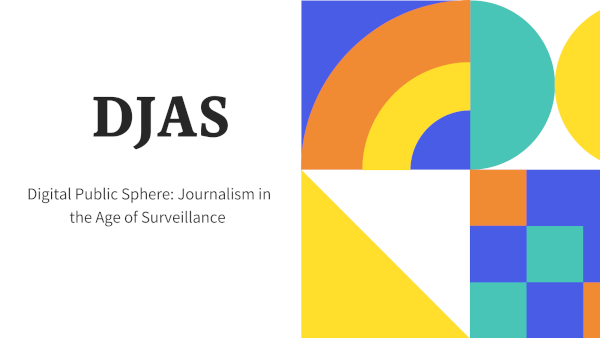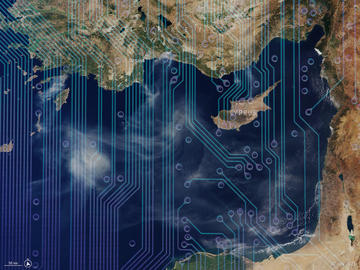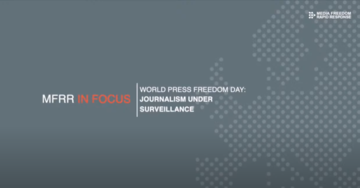The DJAS project (Digital Public Sphere: Journalism in the Age of Surveillance) explores the impact of the surveillance society on Italian journalism. By surveillance society we mean a social, political, and economic context where information collection practices and technologies, especially digital ones, multiply and become pervasive. These can take transparent, opaque, or intrusive forms, and range from the collection and processing of data with explicit consent to the use of malicious software to break into digital devices such as laptops and smartphones.
These practices and technologies alter the context and environment in which journalists operate and often threaten the safety of themselves and their work as well as that of their sources and loved ones.
At the same time, they also represent a new opportunity that journalists have begun to use to integrate and enhance their work, such as the use of drones, satellite tools, or data extraction from the Internet and social media.
DJAS therefore wants to encourage the Italian journalistic community to reflect on the changes that the surveillance society is introducing, also by involving institutions, bodies, and professional organisations as well as the public itself. The goal is for Italian journalism to develop a greater awareness of these phenomena and, consequently, to equip itself with criticism and defense tools as well as its own ethical and deontological code in line with the changed context. Ultimately, to refine the ability to tell the public about the great transformations that the surveillance society introduces in our lives.
MEDIA Greece: refugee reporting in times of surveillance
Thessaloniki | Mary Drosopoulos | 19/9/2023It could be the plot of a psychological thriller movie. It's the true story of a young investigative journalist, Stavros Malichudis, who unintentionally became one of the protagonists of the Greek Watergate. His reports, awarded with many international prizes, told the stories of refugees in Greece
INTERVIEW Surveillance: after Pegasus and Predator, the EU is (slowly) taking action
Paola Rosà | 18/9/2023While the European Parliament's Commission enquires on the various states where surveillance technologies have been commercialised despite the bans, the emphasis remains on civil society and digital security. Interview with Lorenzo Bagnoli of IrpiMedia
MEDIA Trudeau against Facebook: social media, copyright, and information
Paola Rosà | 15/9/2023In protest against the new Canadian law that requires social media to pay news organisations every time a user shares a link, Facebook has blocked access to news portals, earning the condemnation of Prime Minister Trudeau. In Europe, meanwhile, new regulations are on their way on the removal of content, advertising, and disinformation
MEDIA Wiretapping and trojans: the Nordio bill alarms journalists
Paola Rosà | 8/9/2023For the Italian Press National Federation and trade associations, the crackdown on the dissemination of transcripts is a new attack on freedom of the press and citizens' right to be informed. Even MPs are in turmoil, worried that the "cyber interceptor" – aka trojan - will get out of the hands of its users
MEDIA European Media Freedom Act: the end of source confidentiality?
Dimitri Bettoni | 30/8/2023The new European regulation aims to protect the secrecy of journalistic sources, the key concept at the heart of journalism, but actually risks legitimising its systematic violation
SCANDAL “Predatorgate”, dozens of Greek ministers and journalists under surveillance
Athens | Alessio Giussani | 9/11/2022New revelations reopen the surveillance scandal in Greece: dozens of journalists, politicians, and entrepreneurs were targeted by secret services and spyware. Who gave the orders?
SURVEILLANCE Why the "Greek Watergate" earthquake has only just begun
Athens | Alessio Giussani | 24/8/2022A digital surveillance scandal targeting PASOK-KINAL leader Nikos Androulakis and investigative journalist Thanasis Koukakis, via Predator spyware. The so-called "Greek Watergate" is shaking the Mitsotakis government
SCANDAL Turkey, all citizens under surveillance
Dimitri Bettoni | 1/8/2022For almost two years, the Telecommunications and Information Technology Authority, a Turkish ministerial body, has been requesting the metadata of all their customers' traffic from Internet service providers. This mass surveillance operation was revealed by an investigation by journalist Dogu Eroglu
MEDIA Media and surveillance, the Predator scandal shakes Greece
Athens | Alessio Giussani | 19/5/2022As Greece loses 38 positions in the annual Reporters Without Borders ranking compared to 2021, the public learns about the surveillance of investigative journalist Thanasis Koukakis. The spyware used is called Predator and it is still unclear who is behind it
VIDEO WPFD 2022: Journalism under Surveillance
4/5/2022On May 3, recorded event was aired to observe the World Press Freedom Day 2022. The theme of the year is the impact of surveillance on journalism
EUROPEAN PARLIAMENT Surveillance and abuse: a European Parliament inquiry commission to shed light on the Pegasus scandal
Rossella Vignola | 28/4/2022The European Parliament approved by a large majority the establishment of a commission of inquiry to shed light on the abuse of Pegasus and other digital surveillance tools against journalists, critical voices, and opposition figures in the countries of the European Union
MEDIA A conversation on surveillance in journalism
Dimitri Bettoni, Federico Caruso | 22/3/2022From the Pegasus spyware investigation to mass surveillance: a dialogue with researcher Philip Di Salvo to understand the impact of new technologies for all those involved in journalism and beyond
An introduction to the topic of Journalism and Surveillance
As part of the DJAS-Panelfit collaboration, a debate with the scholar Philip Di Salvo around the main issues of Journalism and digital surveillance technology.
Debating the Pegasus case: the impact of spywares on journalism, European regulations of dual use technology, and the future of the surveillance industry.
As part of the DJAS-MFRR collaboration, this first episode in a new podcast series explores the use of this spyware technology and how it is posing fresh concerns for journalists’ safety and source confidentiality. Jamie Wiseman, the Europe Advocacy Officer at the International Press Institute (IPI), interviewed Stephanie Kirchgaessner, the Guardian’s lead reporter on Pegasus, and Dimitri Bettoni, a researcher and project coordinator at the Osservatorio Balcani e Caucaso Transeuropa in Italy, which is part of the MFRR.
Cybersecurity in EU
As part of the DJAS-Panelfit collaboration, a cycle of online conferences co-organized by OBCT by the DJAS - PANELFIT projects coordinators. In this episode, we zoom in on cybersecurity. An international journalistic investigation has brought to light the threat to democracy posed by spying attacks as one recent example.
Global democracy under cyber attack – the Pegasus Project and EU’s cybersecurity strategies
This publication has been produced within the DJAS project, supported in part by a grant from the Foundation Open Society Institute in cooperation with the OSIFE of the Open Society Foundations. The contents of this publication are the sole responsibility of Osservatorio Balcani Caucaso Transeuropa
This project has received funding from the European Union’s Horizon 2020 research and innovation programme under the Marie Skłodowska-Curie grant agreement No 765140
















